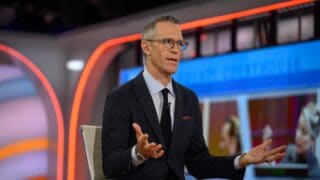The Lavin Agency Speakers Bureau
A speakers bureau that represents the best original thinkers,
writers, and doers for speaking engagements.
A speakers bureau that represents the best original thinkers,
writers, and doers for speaking engagements.
Data is human: when we understand how people behave, we'll give our good ideas the voltage to be great.
If you’ve ever ridden an Uber or Lyft, used Tinder or Facebook, or voted in an election, award-winning economist JOHN LIST has changed your life for the better. He studies how human behavior impacts business, education, and public health, and uses this data to help organizations grow. In his groundbreaking book, The Voltage Effect, John teaches us how to solve urgent problems by scaling our great ideas so we can reach new customers, attract donors, and “make the world a better place.”
“John List is a scientist, but he’s also a magician, and he’s changing the world.”— Cass R. Sunstein, New York Times bestselling co-author of Nudge
John List’s revolutionary work in behavioral economics has influenced how policymakers address social issues and led him to work with the world’s most innovative companies: Lyft, Uber, Facebook, Google, and Tinder, to name a few. Nobel Prize for Economics winner Gary Becker says that “John List’s work is revolutionary”. Whether you’re growing a small business, rolling out an inclusion and belonging program, or delivering billions of doses of a vaccine, John List can help you use the best data about human behavior to make the decisions that lead to growth and success.
John’s book The Voltage Effect: How to Make Good Ideas Great and Great Ideas Scale is a practical guide on how to grow your great ideas. He draws on his experience helping the world’s top companies to introduce us to his concept of voltage: a set of characteristics that all great ideas need to have before they can grow. In his previous international bestseller The Why Axis, John and co-author Uri Gneezy teach us how to close the wealth gap between students, how to improve inner-city schools, and how to promote inclusion and belonging in day-to-day life. Freakonomics co-author Steven D. Levitt called the book “one of the greatest innovations in economics of the last fifty years.”
John’s work has been featured in the New York Times, the Economist, Harvard Business Review, Fortune, NPR, Slate, NBC, Bloomberg, and The Washington Post. He’s the Homer J. Livingston Professor of Economics at the University of Chicago, he’s served on the Council of Economic Advisers, and he’s the recipient of numerous awards and honors including the Kenneth Galbraith Award.

Author of The Loop: How A.I. is Creating a World without Choices and How to Fight Back NBC News Technology Correspondent Former Editor-in-Chief of Popular Science Magazine AI Strategic Advisor to Fortune 500 Companies

Harvard Economist MacArthur Genius Studying Economic Opportunity Director of Opportunity Insights

Instant New York Times Bestselling Author of Empire of AI TIME100 AI Honoree Lead Designer of The Pulitzer Center's AI Spotlight Series

Harvard Economist MacArthur Genius Studying Economic Opportunity Director of Opportunity Insights

Historian New York Times Bestselling Author of Humankind: A Hopeful History, Utopia for Realists, and Moral Ambition
Author of The Age of Cryptocurrency and Our Biggest Fight Co-Host of the Money Reimagined Podcast MIT Media Advisor

Author of Jerks at Work and Job Therapy NYU Professor of Psychology

Global AI Advisor CEO & Co-Founder of XLabs and Ribo One of Forbes’ 30 Women in AI to Watch Artificial Intelligence Pioneer

Author of Self-Compassion: The Proven Power of Being Kind to Yourself Co-founder of the Center for Mindful Self-Compassion

Author of Grit, the #1 New York Times Bestseller | Pioneering Researcher on Grit, Perseverance, and the Science of Success

2024 Nobel Prize Winner | 3rd Most Cited Economist in the World | Bestselling Co-Author of Why Nations Fail and Power and Progress

Harvard Business School Behavioral Science Professor | "40 Under 40 MBA Professor" | Author of TALK: The Science of Conversation and the Art of Being Ourselves

#1 New York Times Bestselling Co-Author of Abundance | Host of thePlain English Podcast | Founder of the Substack Derek Thompson

#1 New York Times Bestselling Author of How the Word Is Passed and Above Ground | The Atlantic Staff Writer
